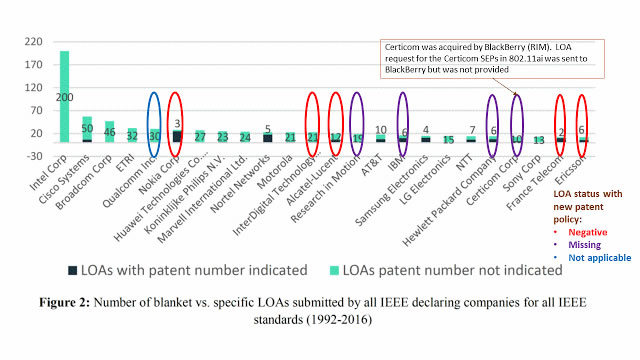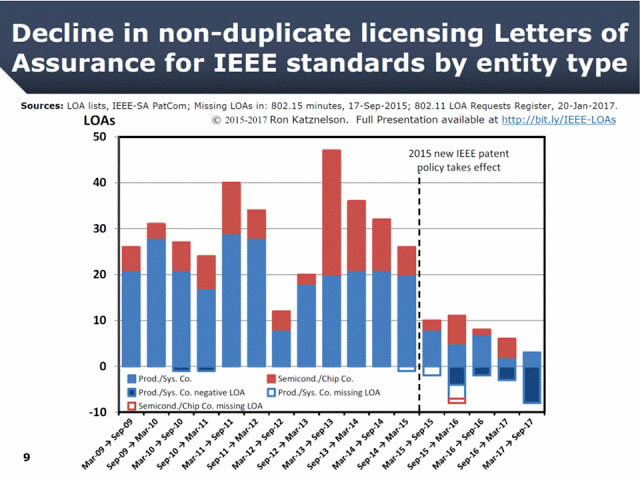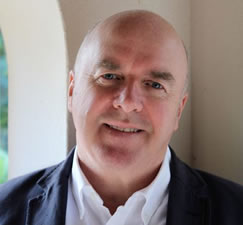I recently wrote a paper for 4iP Council about the effect of the Institute of Electrical and Electronics Engineers' (IEEE) 2015 patent patent policy change on submissions of Letters of Assurance (LOAs) indicating whether patents are pledged to the new policy. In this, I have reviewed some third-party analysis on adoption of the new patent policy and LOAs. And, I have also included my own analysis of LOA data available from IEEE. The summary of my paper is reproduced below with some updated figures from one third-party analyst and with the addition of an IEEE logo:
In March 2015, IEEE significantly amended its patent policy in what was couched as an "update" but that seeks to significantly revise commitments from parties holding patent claims essential to IEEE standards to license those rights on reasonable and non-discriminatory (RAND) terms. Changes disallow patent holders from receiving any value attributable to the standards, require licensing at the smallest saleable patent practicing unit level, and deny these rights holders entitlement to seek an injunction against an unlicensed implementer until appellate review is exhausted. IEEE's stated objective was to protect implementers from patent holdup, which was alleged without any substantiation.[1] IEEE is promoting, by reducing technology licensing costs, the short-term interests of certain implementers while undermining standard-essential patent values and the ability of SEP owners to receive adequate compensation, they are entitled to, from licensing their SEPs.
As I predicted in the IP Finance blog prior to the adoption of this controversial new patent policy,[2] and as indicated by others including senior government officials,[3] the purported "clarification" is significantly jeopardising the IEEE Standards Association as a venue for development of open technology standards that include significant patented intellectual property. Large proportions of contributors to IEEE standards are now unwilling to provide "positive" Letters of Assurance ("LOAs") under IEEE's new patent policy.
In this paper, I have reviewed available data on LOAs and some third-party analysis of this. My conclusions are striking: almost three quarters (i.e. 73 percent) of LOAs for the IEEE flagship 802.11 WiFi standard, accepted by IEEE and posted on its website in the 18-month period to June 2017, are "negative" LOAs, indicating the submitter's legitimate ex ante refusal to pledge RAND licensing under the new patent policy. Nearly half (i.e. 47 percent) of all accepted LOAs posted on the IEEE website over the same period are negative LOAs. More than one third (i.e. 42 percent) of companies portrayed as leaders with LOAs to IEEE standards are unwilling to pledge their SEPs under the new patent policy or have not provided LOAs when asked to do so.
The new patent policy has created a perverse situation among patent owners and implementers. In the absence of positive LOAs, implementers are left uncertain about which patent policy applies, if any, and about future ability to implement the standard. Therefore, implementers may be unclear whether many SEPs are subject to new licensing terms, the old licensing terms or are not subject to RAND licensing terms under any patent policy at all. This is unacceptable. Proponents of the new patent policy are also lamenting this lack of clarity, while trying to use this as a pretext to breach binding contractual agreements between IEEE and patent owners in previously-accepted LOAs.[4]
Chart 1: More than one third (10/24=42%) of companies IPlytics portrays as leaders with LOAs to IEEE standards are unwilling to pledge their SEPs under the new patent policy or have not provided LOAs when asked to do so

Source: IPlytics empirical study report on patenting and standardisation activities at IEEE [5] (black and green); WiseHarbor added Chart titles in bold black, identifiers and annotations in other colours.
Orange is the successor to France Telecom.
"Not applicable:" Positive blanket LOA accepted prior to March 2015 under previous patent policy.
Approvals for "standard-amendments" 802.11ah and 802.11ah deferred with policy impasse
There is deadlock between the two sides of this argument - largely, patent owners who seek adequate compensation from licensing their SEPs versus some implementers[6] who would like to minimise their costs. Despite attempts by advocates of the new patent policy text to portray IEEE standardization work as continuing to proceed well, to the contrary, this is an illusion with unreconciled differences regarding applicable patent policy and LOAs. Previous attempts to significantly undermine rights of patent owners in other standard development organizations (SDOs) have failed: for example; with an intellectual property rights (IPR) policy change at ETSI in the 1990s that was abandoned before taking effect.
Unwillingness of SEP holders to pledge to the new patent policy are delaying standardization approval decisions. IEEE seeks to approve standards for which all known SEPs are pledged under the new patent policy with accepted IEEE LOA forms. But it is failing in this objective with an unprecedented high number of negative LOAs submitted and because LOAs requested from others are not forthcoming and should therefore be regarded as "missing." Negative LOAs that have been accepted by IEEE are, for example, with standard-amendments 802.11ai and 802.11ah. However, numerous other prospective negative LOAs have been rejected by IEEE because patent owners have sought to indicate - and IEEE has refused to allow - willingness to license on a basis other than the new patent policy, such as on the basis of the previous IEEE patent policy. With numerous known SEPs for which there are no licensing commitments, the above amendments to the 802.11 standard have only been "conditionally approve[d]" by the IEEE-SA's Standards Board.[7]
Conditional approvals are merely deferral tactics because there can be no reasonable expectation that the LOA conditions preventing full approval with the new patent policy will ever be met. Patent holders who have submitted negative LOAs are not going to change their minds and replace them with positive LOAs in the prevailing circumstances. Similarly, it seems very unlikely that those who acknowledge receipt of a request for an LOA but refuse to submit a positive LOA are likely to change their minds about doing so and submit a positive LOA. Deferring full approval until these two amendments are rolled up into the next version of the entire standard (i.e. 802.11/D10) amounts to "kicking the can down the road."[8]
This impasse has occurred because many contributors to IEEE standards are, independently of each other, unwilling to pledge assurances under the new patent policy, which was established without consensus[9] among a closed group of interested parties. The new patent policy text is purported to be a "clarification" of existing patent policy and not a new patent policy - begging the question why many of the new positive LOAs submitted merely restate previous LOAs already-submitted pursuant to the previous patent policy needed to be submitted at all. It is, instead, increasingly creating ambiguities and concerns that courts might interpret new conditions as mandatory. Many patent owners are unwilling to agree to the new patent policy because being bound by it could undermine their licensing businesses - including pre-existing agreements.
Adjusted LOA counts have reduced dramatically since introduction of new patent policy
The counts of submitted LOAs have been misleadingly presented to suggest that the new patent policy is having no overall adverse effect on licensing commitments. The numbers of accepted LOAs since the patent policy change have been inflated by a large proportion of "duplicate" LOAs (resubmissions of LOAs for standards for which there are already existing LOAs) that are not required by IEEE bylaws. Instead, after some well-justified adjustments to LOA counts for these and for negative LOAs and "missing" LOAs (in cases where IEEE sought from a disclosed essential patent holder, but did not receive, an accepted LOA), figures indicate that LOAs are dramatically and statistically significantly lower since the patent policy change. This indicates major adverse effects.
Chart 2: Rejection of IEEE's new patent policy is indicated by dramatic fall in positive LOAs[10]

Continuing activity in technical working groups, for now, is no assurance this will persist
Technical working group activity is continuing while participating companies wait to see if conflicts will be resolved so that new standards, as well as improvements and amendments to existing standards, will be approved. However, any suggestions that the continuing rate of Project Authorization Requests (PARs) - to commit IEEE-SA resources to new standard-development work - indicate that all is well in IEEE standardisation are phoney. Many IEEE projects do not include many, or even any, patented technologies: so, these might be unaffected by difficulties with the new patent policy. The standards that provide significant innovative value beyond compatibility are rich in patented technologies. LOAs identify these patents, their ownership, and the basis upon which they can be licensed. For those standardisation projects that include significant patented technologies, it is what is occurring with LOAs, rather that PARs, that spells trouble.
It could be several years before it is evident how much IEEE standardisation has been harmed. For example, clarity (to implementers, in particular) could be rapidly restored by allowing patent owners optionally to indicate their willingness to license based on the old patent policy. Meanwhile, IEEE standardisation work including supporting R&D and product implementation will suffer as participants consider switching to other SDOs. By then it could be too late to fix things.
The Whole Story
My entire paper can be accessed from 4iP Council's web site, here. Since its publication this month, Ron Katznelson has updated his analysis to 20th September 2017, here, as also reflected in my summary for IP Finance, above.
______________________________
[1] IEEE-SA request for business review letter, November 7, 2014; http://www.gtwassociates.com/answers/DOJ%20PDF/IEEEBRL2015/PatentHoldUpasRationaleIEEE_Bus_Review_Document_02_11072014.pdf
[2] Keith Mallinson: IEEE will jeopardise its attractiveness as venue for standards development if proposed new IP policies are adopted, February 6, 2015; http://www.ip.finance/2015/02/ieee-will-jeopardise-its-attractiveness.html
[3] See e.g. Former Rep. Terry Lee, Don't turn off Wi-FI (January 8, 2015), available at http://thehill.com/blogs/congress-blog/technology/228817-dont-turn-off-wi-fi; Adam Mossoff, Reality Check: Weakening Wireless Technology Patents Hurts Everyone (RCR Wireless News, January 28, 2015) available at http://www.rcrwireless.com/20150128/opinion/reality-check-weakening-wireless-technology-patents-hurts-everyone-tag10; Leah Nylen and Lewis Crofts, EU Warns of Impact of IEEE's Patent Policy Change (MLex, January 27, 2015); U.S. Senator Christopher Coons letter to U.S. Department of Justice (14 January 2015) available at http://www.advancingengineering.org/christopher-coons.
[4] See March 2017 slides by Gil Ohana on behalf of Cisco at http://grouper.ieee.org/groups/pp-dialog/email/pdf6eBTMFaO8V.pdf, http://grouper.ieee.org/groups/pp-dialog/email/msg00437.html and comments in response at http://grouper.ieee.org/groups/pp-dialog/email/msg00418.html.
[5]https://asoft20107.accrisoft.com/atfrand/clientuploads/news/IPlytics_2017_Patenting%20and%20standardization%20activities%20at%20IEEE.pdf
[6] This paper's author recognises that a large proportion of implementers are also patent owners.
[7] http://standards.ieee.org/about/sasb/1216sasbmin.pdf#page=22
[8] "Put off confronting a difficult issue or making an important decision, typically on a continuing basis." Oxford Living Dictionaries.
[9] To mask it, in the fall of 2014, the IEEE-SA removed the most-prominent indication of its previously long-standing principles of consensus, due process and openness from its website. See comparative website snapshots http://web.archive.org/web/20140723051820/http://standards.ieee.org/about/strategy.html versus new page: http://standards.ieee.org/about/strategy.html.
[10] Standard Essential Patents - the empirical record since adoption. Symposium on Antitrust, Standard Essential Patents, and the Fallacy of the Anticommons Tragedy, Berkeley, CA. October 29, 2016. [Updated March, 2017 in my full report and, again, to September 2017 in this summary for IP Finance] Ron D. Katznelson, Ph.D.* http://bit.ly/IEEE-LOAs












